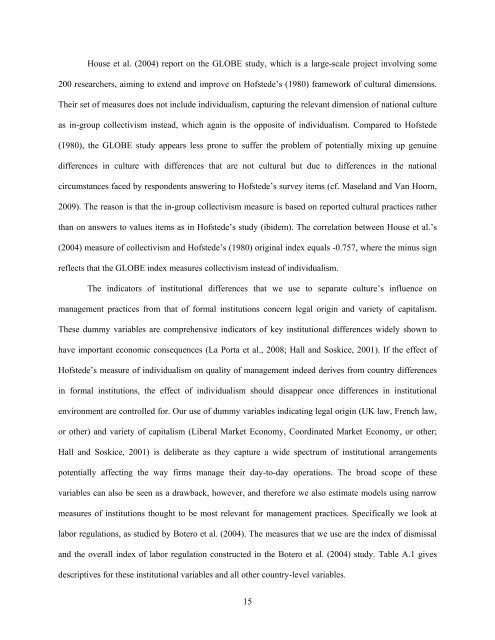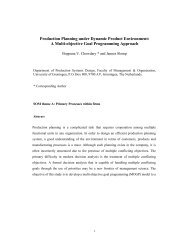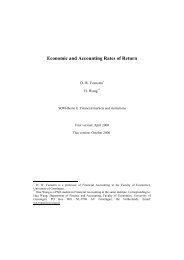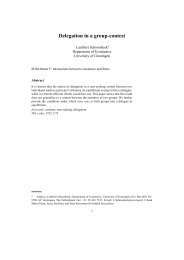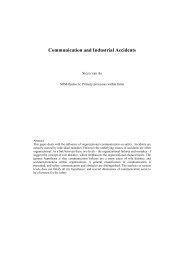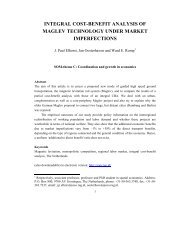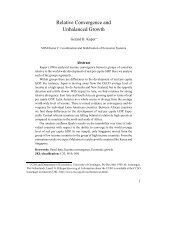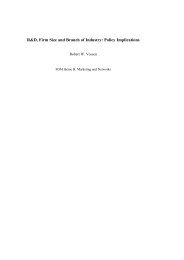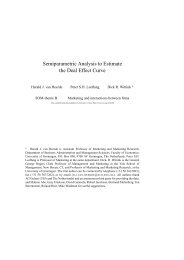Individualism and the cultural roots of management practices
Individualism and the cultural roots of management practices
Individualism and the cultural roots of management practices
Create successful ePaper yourself
Turn your PDF publications into a flip-book with our unique Google optimized e-Paper software.
House et al. (2004) report on <strong>the</strong> GLOBE study, which is a large-scale project involving some<br />
200 researchers, aiming to extend <strong>and</strong> improve on H<strong>of</strong>stede’s (1980) framework <strong>of</strong> <strong>cultural</strong> dimensions.<br />
Their set <strong>of</strong> measures does not include individualism, capturing <strong>the</strong> relevant dimension <strong>of</strong> national culture<br />
as in-group collectivism instead, which again is <strong>the</strong> opposite <strong>of</strong> individualism. Compared to H<strong>of</strong>stede<br />
(1980), <strong>the</strong> GLOBE study appears less prone to suffer <strong>the</strong> problem <strong>of</strong> potentially mixing up genuine<br />
differences in culture with differences that are not <strong>cultural</strong> but due to differences in <strong>the</strong> national<br />
circumstances faced by respondents answering to H<strong>of</strong>stede’s survey items (cf. Masel<strong>and</strong> <strong>and</strong> Van Hoorn,<br />
2009). The reason is that <strong>the</strong> in-group collectivism measure is based on reported <strong>cultural</strong> <strong>practices</strong> ra<strong>the</strong>r<br />
than on answers to values items as in H<strong>of</strong>stede’s study (ibidem). The correlation between House et al.’s<br />
(2004) measure <strong>of</strong> collectivism <strong>and</strong> H<strong>of</strong>stede’s (1980) original index equals -0.757, where <strong>the</strong> minus sign<br />
reflects that <strong>the</strong> GLOBE index measures collectivism instead <strong>of</strong> individualism.<br />
The indicators <strong>of</strong> institutional differences that we use to separate culture’s influence on<br />
<strong>management</strong> <strong>practices</strong> from that <strong>of</strong> formal institutions concern legal origin <strong>and</strong> variety <strong>of</strong> capitalism.<br />
These dummy variables are comprehensive indicators <strong>of</strong> key institutional differences widely shown to<br />
have important economic consequences (La Porta et al., 2008; Hall <strong>and</strong> Soskice, 2001). If <strong>the</strong> effect <strong>of</strong><br />
H<strong>of</strong>stede’s measure <strong>of</strong> individualism on quality <strong>of</strong> <strong>management</strong> indeed derives from country differences<br />
in formal institutions, <strong>the</strong> effect <strong>of</strong> individualism should disappear once differences in institutional<br />
environment are controlled for. Our use <strong>of</strong> dummy variables indicating legal origin (UK law, French law,<br />
or o<strong>the</strong>r) <strong>and</strong> variety <strong>of</strong> capitalism (Liberal Market Economy, Coordinated Market Economy, or o<strong>the</strong>r;<br />
Hall <strong>and</strong> Soskice, 2001) is deliberate as <strong>the</strong>y capture a wide spectrum <strong>of</strong> institutional arrangements<br />
potentially affecting <strong>the</strong> way firms manage <strong>the</strong>ir day-to-day operations. The broad scope <strong>of</strong> <strong>the</strong>se<br />
variables can also be seen as a drawback, however, <strong>and</strong> <strong>the</strong>refore we also estimate models using narrow<br />
measures <strong>of</strong> institutions thought to be most relevant for <strong>management</strong> <strong>practices</strong>. Specifically we look at<br />
labor regulations, as studied by Botero et al. (2004). The measures that we use are <strong>the</strong> index <strong>of</strong> dismissal<br />
<strong>and</strong> <strong>the</strong> overall index <strong>of</strong> labor regulation constructed in <strong>the</strong> Botero et al. (2004) study. Table A.1 gives<br />
descriptives for <strong>the</strong>se institutional variables <strong>and</strong> all o<strong>the</strong>r country-level variables.<br />
15


